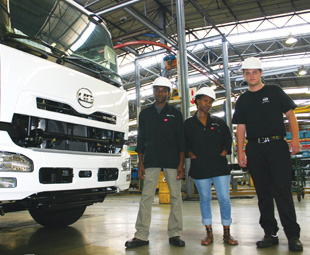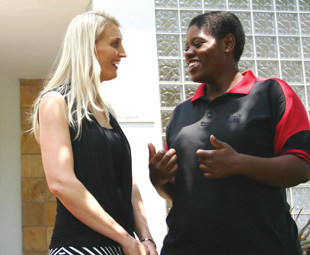Moving on up

UD Trucks is creating a legacy, and that’s not just PR talk. GAVIN MYERS met up with the team behind the company’s ongoing developmental programmes and encountered a vitality that moved him
A warehouse isn’t exactly the most riveting place to work. It doesn’t take a degree in engineering to do one’s job. A picker-packer, for example, simply receives an order for a part, picks it, and sends it into the system.
Jacqueline Kekana started off as just that: a picker-packer. She joined UD Trucks Southern Africa in 2005 while studying electrical engineering. Unfortunately, she couldn’t complete her qualification and carried on at UD Trucks. It’s something she considers a blessing in disguise.
During 2009, the company experienced a downturn due to the recession. It decided to re-skill rather than retrench staff, and introduced a team leader learnership programme. Kekana applied, and participated in the year-long learnership, comprising six months of theory classes and another six months of on-job training.
That was one of the first such programmes. UD Trucks now runs a number of different learnership programmes that result in learners receiving a qualification as with a university or techinikon. The learnerships are advertised at FET (Further Education and Training) colleges and in the community surrounding the UD Trucks plant in Rosslyn, Pretoria, and are also open to current employees. About 120 learners participate every year, while the company currently employs just 300 people. The initiative is headed by Telishia Middleton, training and development manager, human resources, UD Trucks.
Tirsa Koen, general manager human resources UD Trucks Southern Africa, says the company already had an academy facility that was used primarily for dealer and internal training. Middleton and her assistant – dubbed by Koen as the fun side of the HR department – now also run the different internal and external learnership programmes from the facility.
“In 2010 we started with a ‘manufacturing, engineering and related activities’ learnership, recruiting 40 individuals from the community and family members of those in our plant,” says Koen. “It was also with the idea that if production volumes go up, we have a pool of well-qualified people to call on.” Last year, all 40 were indeed employed on a temporary basis, and from those 40, eight have been appointed permanently.
 Middleton continues: “We also have a diesel mechanic learnership, normally taking learners from schools or FET colleges if they meet the minimum requirements.” Learners are put through an 18-month programme in order to qualify them with a Red Seal diesel mechanic artisan qualification. The company tries to have twice-yearly intakes of 20 such learners.
Middleton continues: “We also have a diesel mechanic learnership, normally taking learners from schools or FET colleges if they meet the minimum requirements.” Learners are put through an 18-month programme in order to qualify them with a Red Seal diesel mechanic artisan qualification. The company tries to have twice-yearly intakes of 20 such learners.
In a similar vein, there is also a yearly experiential programme for students studying towards national diplomas in industrial and mechanical engineering at the Tshwane University of Technology. “They’ll come here and we’ll give them the opportunity to get the workplace experience they need in order to obtain their qualification,” explains Middleton. There are currently five such students at the Rosslyn plant. Eighty percent of these students have been appointed within UD trucks, with some even getting the chance to go to Japan for training and experience.
“We also annually sponsor matriculants who plan to study industrial or mechanical engineering at the University of Pretoria – this is mainly for disadvantaged children. They will study, then work here during the holidays, and if they then pass and we have a vacancy we’ll employ them,” she continues. Last year the company sponsored three students, while this year, from 22 schools, Middleton only found one suitable candidate.
Internally, two current learnerships emanating from needs identified within UD Trucks are a learnership for sales and after sales, and the latest need within the warehousing division, to align it with the completely new direction its supply and logistics division is moving in.
And it’s not that all the learnerships are in relation to UD Trucks either; the company also runs learnerships for the disabled within the community to enhance their skills and knowledge. “Although we can’t always appoint those individuals, we take them in for a year and equip them with skills in communication, mathematics, and business ethics and acumen so that if they decide they want to start a little business we’ve given them that support,” says Koen.
“There are nice stories about some of them – like the guy who started a car wash and employed more people from the community, which was very cool,” adds Middleton, who still has contact with all the learners who have gone through this programme.
“There is a great human element and satisfaction in doing this,” smiles Koen.
“There’s also definite support from all the people throughout the organisation that these learners come into contact with,” notes Middleton. “It’s very positive as extra skills and jobs for their communities are created.” Further, learners also receive a monthly learner allowance so they can afford basics like transport and lunch while they participate in the programme.
Because as much as 70 percent of each programme takes place within the actual workplace, all managers have been trained as mentors and coaches, to properly guide the learners through their programmes. In addition to the company using its own subject matter experts, it does also approach external training providers for the moderation and assessment of learners. The company is considered a training institution, and is recognised among the top training companies in South Africa by merSETA.
Management buy-in is also very high, says Middleton. “It’s definitely more beneficial to employ staff this way and even if we don’t appoint all the learners, they can approach other OEMs with experience and qualifications, and hopefully find employment,” she continues. UD has employed most of the graduates, though.
It’s certainly not a case of training for training’s sake, as Kekana would agree. Last year, when the company had vacancies for team leaders, she applied and was appointed as group leader for inbound goods to the warehouse from January. “It’s a big jump, but the training gave me a boost to handle it,” she says.
Kekana has also been inspired to study supply chain management through Unisa. “So far it’s been good but challenging, and my family are very proud too,” she smiles.
“I love what I’m doing.”
Published by
Focus on Transport
focusmagsa



